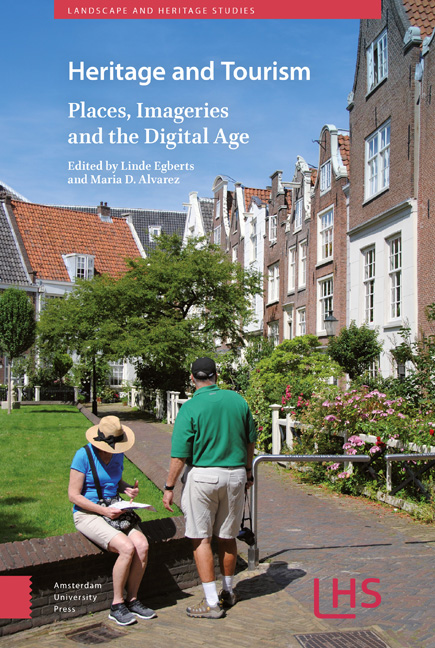Book contents
- Frontmatter
- Dedication
- Contents
- List of Figures and Tables
- Foreword
- 1 Tourism and Heritage: Crafting Experiences Through Innovation
- 2 Tourism Conflicts and Conflict Tourism: Curating “Holoscapes” in Europe’s Age of Crisis
- 3 Heritage Landscapes of Hiroshima and Nagasaki
- 4 Revealing and Presenting the Past(s) for the Public: Fethiye Mosque and Museum as a Cultural Heritage Site in Istanbul
- 5 Who Takes the Lead in Initiating Cooperation in a Cultural Network and Why?: The case study of a Rural Finnish Destination
- 6 Sustainability of Heritage-Tourism Destinations: A Demand-Based Perspective on Cusco, Peru
- 7 Localising National Tourism Websites: The case of World Heritage sites
- 8 Enhancing the Tourist Heritage Experience through “In-Situ”, Customisable, 3D-Printed Souvenirs
- 9 Tracking the Heritage Tourist: Heritage tourism and Visiting Patterns in a Historic City
- 10 The Construction of a Tourist-Historic Icon: The case of the Palace of Westminster, London
- 11 Conclusion
- Index
5 - Who Takes the Lead in Initiating Cooperation in a Cultural Network and Why?: The case study of a Rural Finnish Destination
Published online by Cambridge University Press: 22 December 2020
- Frontmatter
- Dedication
- Contents
- List of Figures and Tables
- Foreword
- 1 Tourism and Heritage: Crafting Experiences Through Innovation
- 2 Tourism Conflicts and Conflict Tourism: Curating “Holoscapes” in Europe’s Age of Crisis
- 3 Heritage Landscapes of Hiroshima and Nagasaki
- 4 Revealing and Presenting the Past(s) for the Public: Fethiye Mosque and Museum as a Cultural Heritage Site in Istanbul
- 5 Who Takes the Lead in Initiating Cooperation in a Cultural Network and Why?: The case study of a Rural Finnish Destination
- 6 Sustainability of Heritage-Tourism Destinations: A Demand-Based Perspective on Cusco, Peru
- 7 Localising National Tourism Websites: The case of World Heritage sites
- 8 Enhancing the Tourist Heritage Experience through “In-Situ”, Customisable, 3D-Printed Souvenirs
- 9 Tracking the Heritage Tourist: Heritage tourism and Visiting Patterns in a Historic City
- 10 The Construction of a Tourist-Historic Icon: The case of the Palace of Westminster, London
- 11 Conclusion
- Index
Summary
Abstract
Value co-creation stemming from cultural heritage and specific local needs is the key element of the process of building a brand identity, particularly in the context of cultural entrepreneurship. Based on the literature on branding and networking our study aims to identify the processes that advance the distinctive branding of a destination by analysing the prerequisites for building a joint brand in a collaborative network. We wanted to study who takes the lead in coordinating cooperation in cultural networks, and who initiates value co-creation processes. Furthermore, we wanted to examine how various actors perceived the coordinating role of the municipality. Our case study is from a small rural destination in Finland where the municipality has taken the initiative to lead and coordinate the value co-creating processes in branding the destination. The empirical data were collected through participative observation and in-depth interviews with municipal representatives, entrepreneurs, and members of associations, and the third sector, and also from local media, policy documents, and websites. A multidimensional concept assigned the acronym BRICK, which stands for: Benefits, Risks, Interaction, Coordination, and Keenness, was used to analyse the data. Our findings show that the development process is still ongoing, and running alongside the cultural and historical perspectives, has been the commercial side of the process addressing the issue of boosting the attraction of the area as a tourism destination. Consequently, the role of value co-creation as an outcome is expanding in terms of affinity, and that of external coordination is diminishing. Our study findings contribute to the theoretical discussion on leadership in the research domain of place branding. The process of building the joint brand for a destination can illustrate for practitioners how to apply academic theory to a real branding case.
Keywords: branding, coordination, cultural networks, creative clusters, cultural heritage
Cultural heritage-based sites offer both individual and shared experiences for the members of a local community. Moreover, these experiences have the potential to spur entrepreneurial activity. The latter, in turn, offers an opportunity to capture new value from modern consumption demands, many of which are associated with culture and the environment. Recent studies on tourism and the creative economy emphasise the need for cross-sector collaboration and convergence to stimulate innovation and development (OECD, 2014).
- Type
- Chapter
- Information
- Heritage and TourismPlaces, Imageries and the Digital Age, pp. 95 - 114Publisher: Amsterdam University PressPrint publication year: 2018



